DILATREND Tablet
ក្រុមហ៊ុនផលិតឱសថ:
Roche S.p.A. Milan, production site Segrate, Italy
ក្រុមហ៊ុនចែកចាយឱសថនៅប្រទេសកម្ពុជា:
DKSH
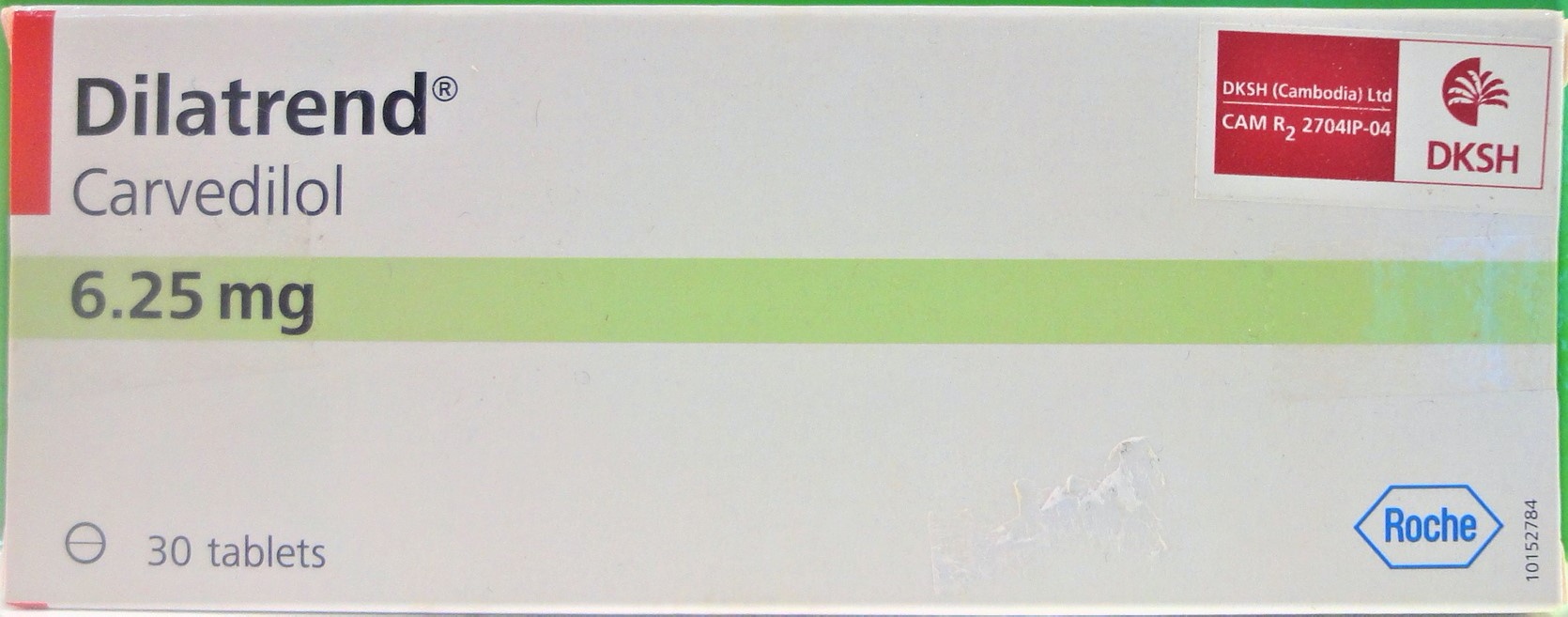
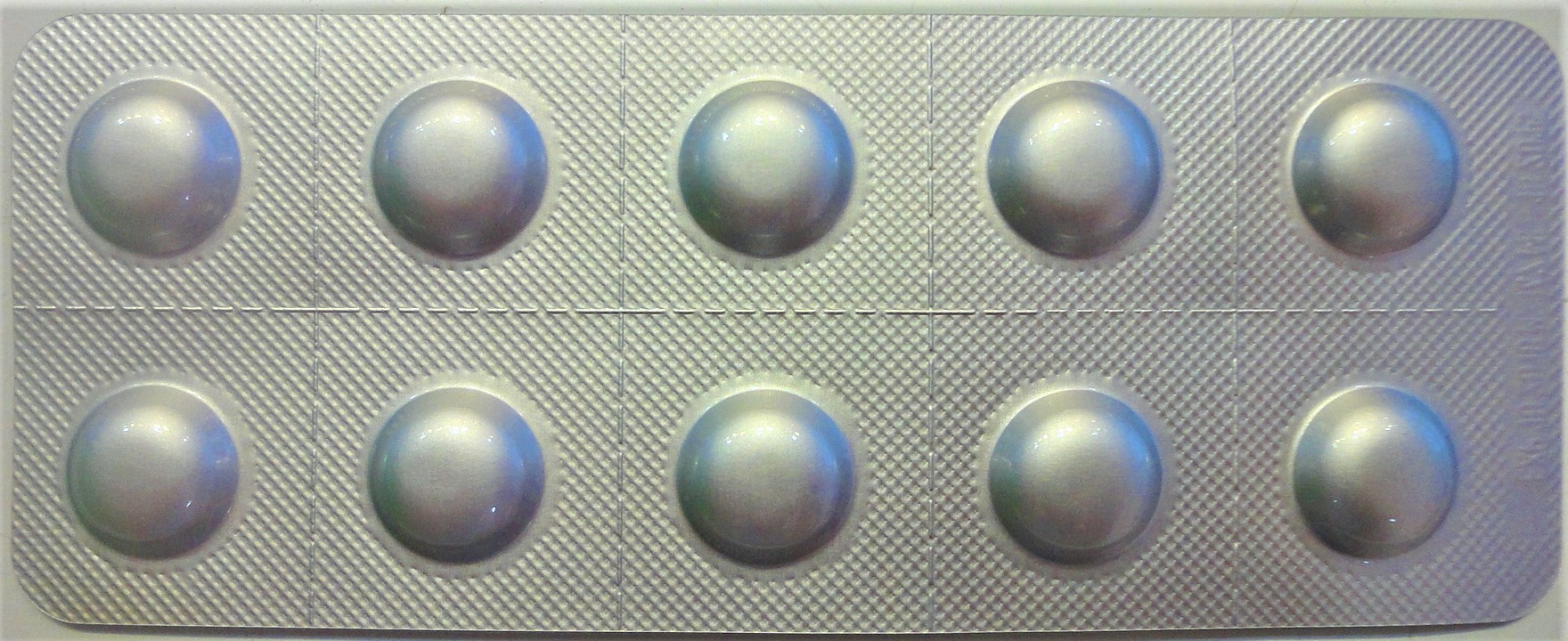
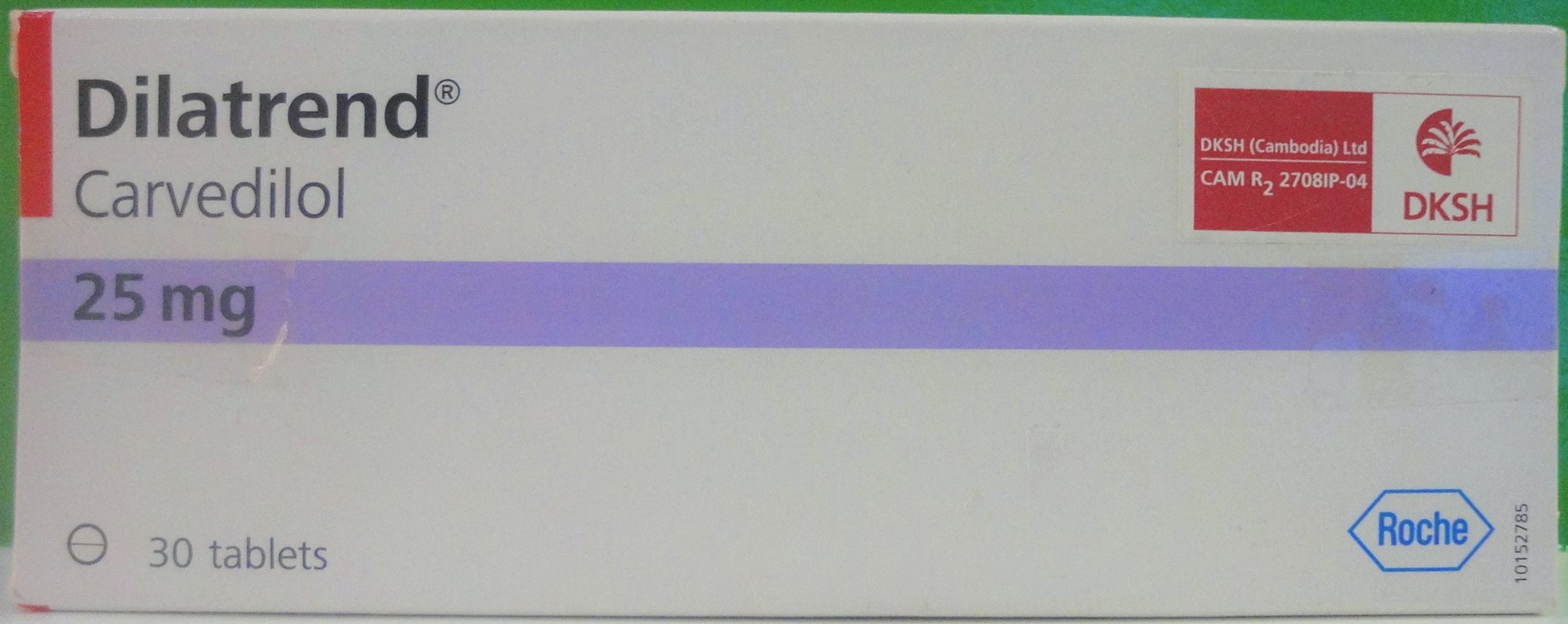
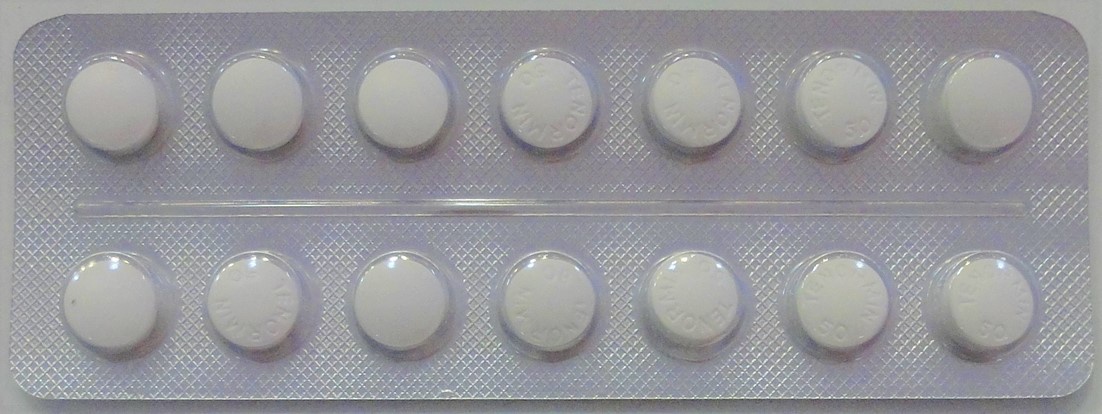
- សារធាតុសកម្ម
- ប្រសិទ្ធិភាពព្យាបាល និង កម្រិតប្រើប្រាស់
- ហាមប្រើ
- ផលរំខាន
- អន្តរប្រតិកម្ម
- ស្ត្រីមានផ្ទៃពោះ និង ស្ត្រីបំបៅដោះកូន
- ការប្រុងប្រយ័ត្នជាពិសេស
- សកម្មភាពឱសថ បរិយាយប័ណ្ណឱសថ
-
សារធាតុសកម្ម
1. DILATREND 3.125mg Tablet:
Carvedilol 3.125mg
2. DILATREND 6.25mg Tablet:
Carvedilol 6.25mg
3. DILATREND 12.5mg Tablet:
Carvedilol 12.5mg
4. DILATREND 25mg Tablet:
Carvedilol 25mg
-
ប្រសិទ្ធិភាពព្យាបាល និង កម្រិតប្រើប្រាស់
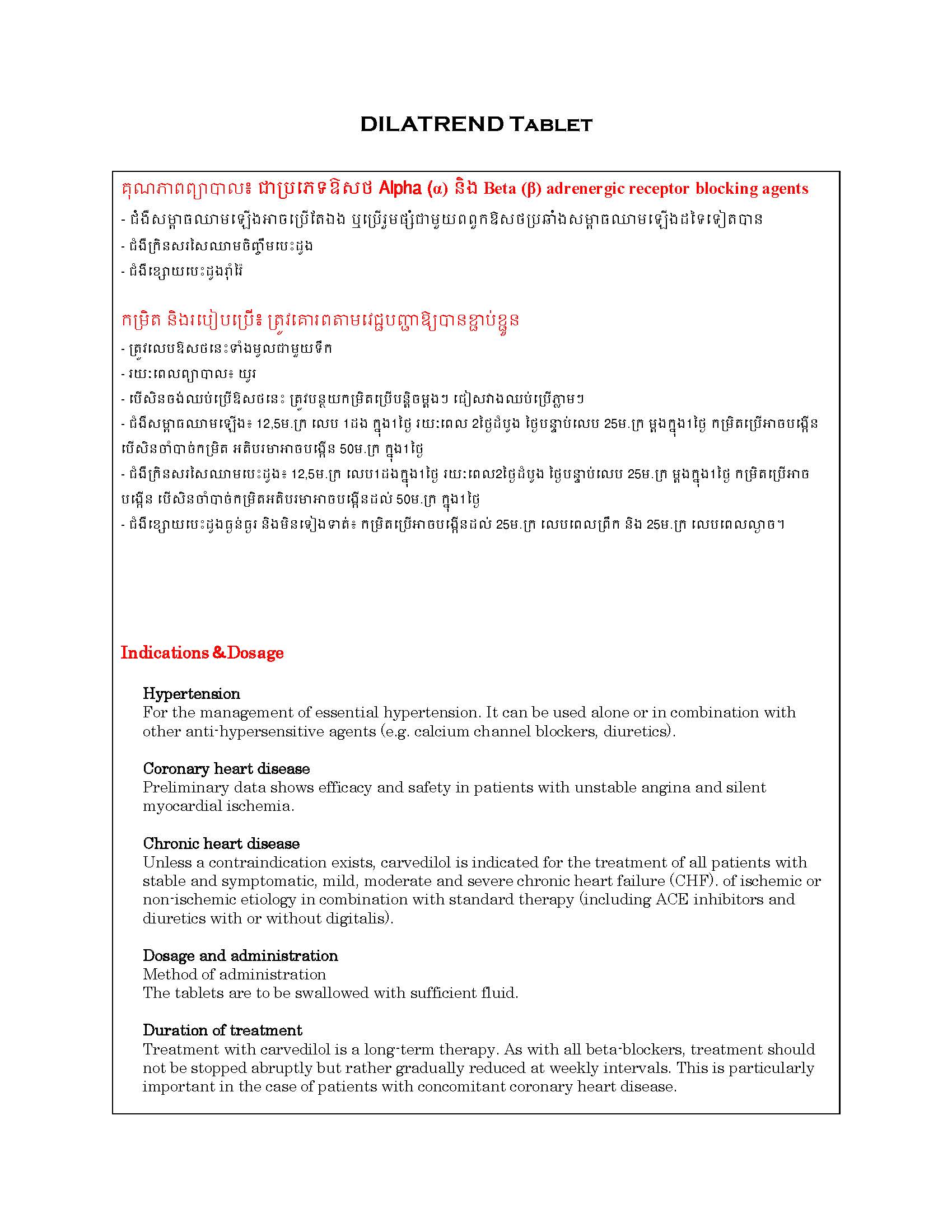
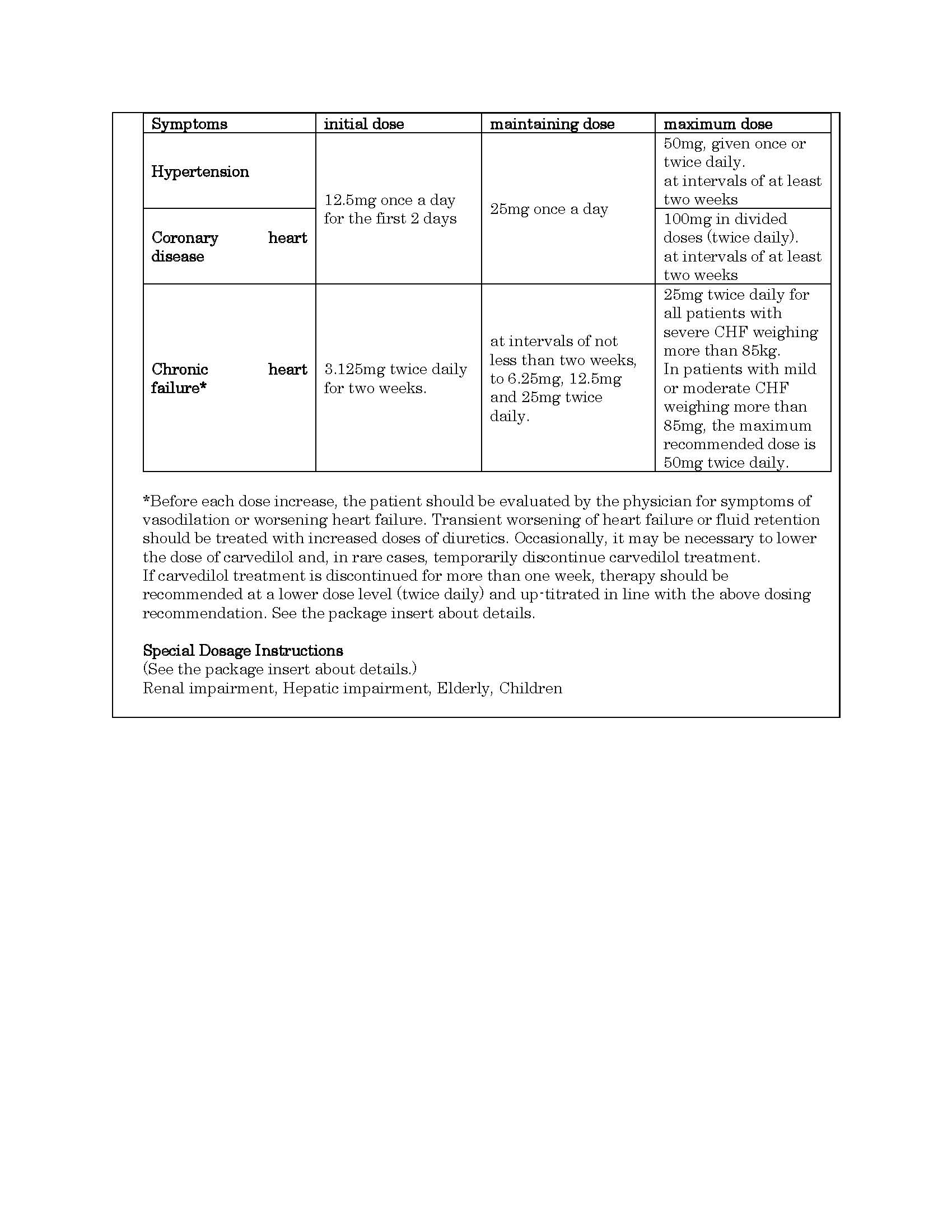
-
ហាមប្រើ
ហាមប្រើ៖
- អ្នកជំងឺងាយមានប្រតិកម្មជាមួយឱសថនេះ ឬជាមួយសារធាតុផ្សំណាមួយនៃឱសថនេះ
- ជំងឺខ្សោយបេះដូងមិនទៀងទាត់
- វិបត្តិមុខងារថ្លើម
- អ្នកជំងឺកម្រិតទី២ និងកម្រិតទី៣ AV block
- ជំងឺចង្វាក់បេះដូងដើរយឺតធ្ងន់ធ្ងរ (តិចជាង ៥០ bpm)
- Sick sinus syndrome (including sino-atrial block)
- ជំងឺសម្ពាធឈាមចុះធ្ងន់ធ្ងរ
- Shock ហ្សុកស្ទះបេះដូង
- អ្នកជំងឺមានប្រវត្តិជំងឺកន្ត្រាក់ទងសួតរួមតូច ឬជំងឺហឺត
In patients with:
- hypersensitivity to carvedilol or any component of the product
- unstable/decompensated heart failure
- clinically manifest liver dysfunction
- 2nd and 3rd degree atrioventricular (AV) block (unless a permanent pacemaker is in place)
- severe bradycardia (<50bpm)
- sick sinus syndrome (including sino-atrial block)
- severe hypotension (systolic blood pressure <85mmHg)
- cardiogenic shock
- history of bronchospasm or asthma
-
ផលរំខាន
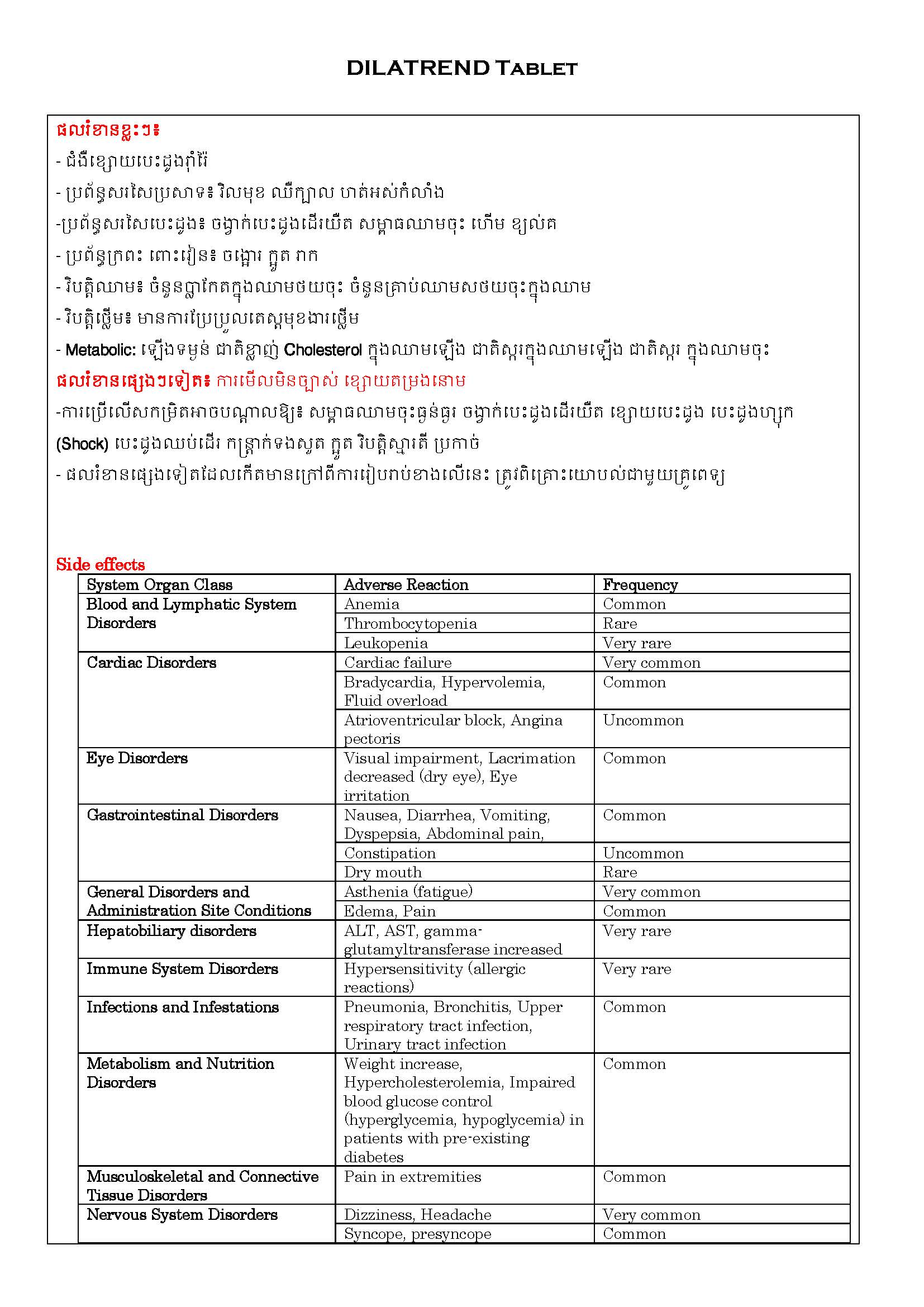
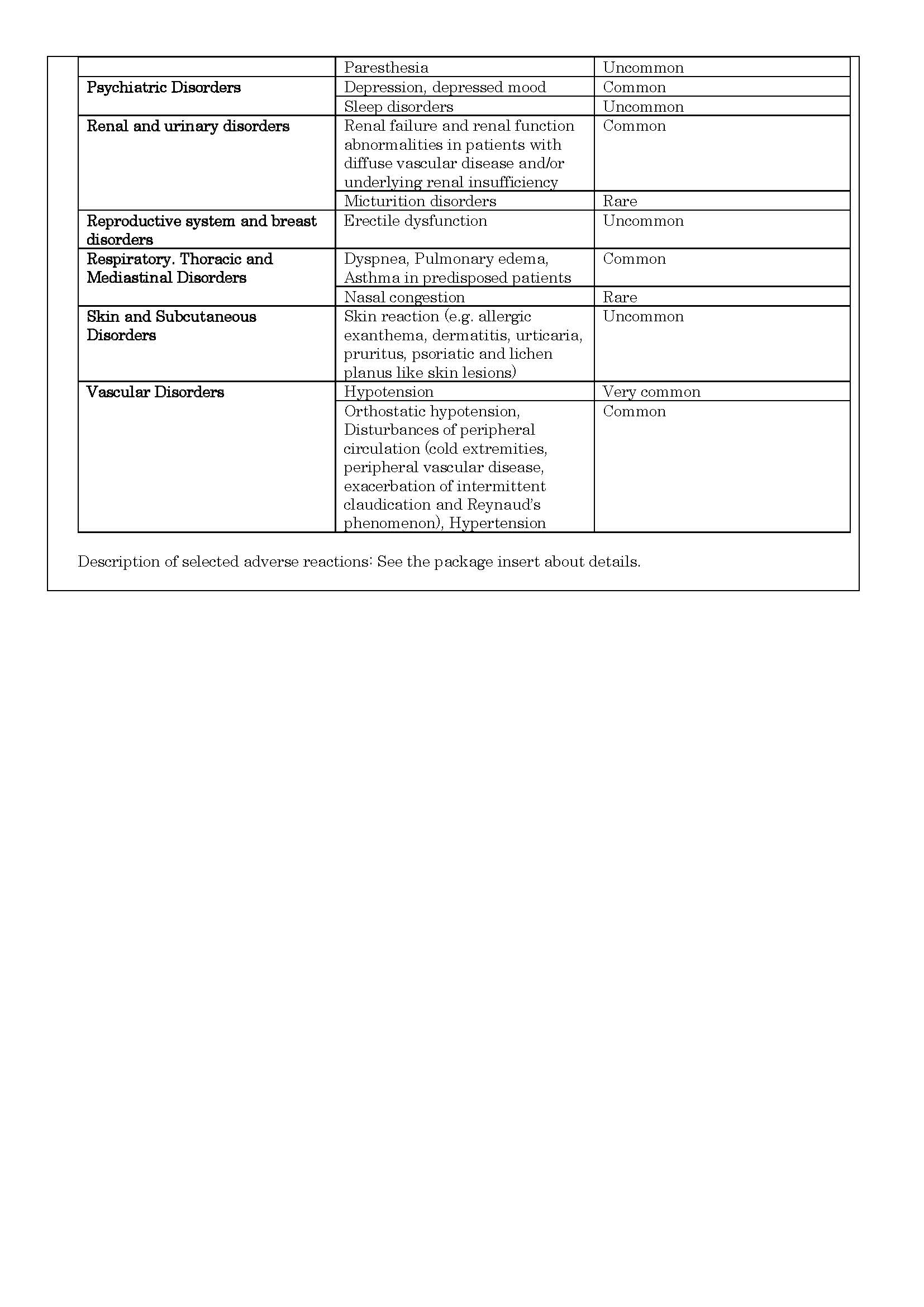
-
អន្តរប្រតិកម្ម
Pharmacokinetic interactions
Effects of carvedilol on the pharmacokinetics of other drugs
Carvedilol is a substrate as well as an inhibitor of P-glycoprotein. Therefore the bioavailability of drugs transported by P-glycoprotein may be increased with concomitant administration of carvedilol. In addition, the bioavailability of carvedilol can be modified by inducers or inhibitors of P-glycoprotein.
Digoxin
Cyclosporin
Effects of other drugs on the pharmacokinetics of carvedilol
Inhibitors as well as inducers of CYP2D6 and CYP2C9 can modify the systemic and/or presystemic metabolism of carvedilol stereoselectively, leading to increased or decreased plasma concentrations of R- and S-carvedilol.
Rifampicin
Amiodarone
Fluoxetine and paroxetine
Pharmacodynamic interactions
Insulin or oral hypoglycemics
Catecholamine-depleting agents
Digoxin
Non-dihydropyridines calcium channel blockers, amiodarone or other anti-arrhythmics
Clonidine
Anti-hypertensives
Anesthetic agents
NSAIDs
Beta-agonist bronchodilators
-
ស្ត្រីមានផ្ទៃពោះ និង ស្ត្រីបំបៅដោះកូន
ស្រ្តីមានផ្ទៃពោះ និងស្រ្តីបំបៅកូនត្រូវប្រើដោយប្រុងប្រយ័ត្ន
(See the package insert about details.)
Pregnancy
Carvedilol should not be used during pregnancy unless the potential benefit outweighs the potential risk.
Nursing Mothers
Breastfeeding is not recommended following administration of carvedilol.
-
ការប្រុងប្រយ័ត្នជាពិសេស
ការប្រុងប្រយ័ត្នចំពោះ៖
- ជំងឺស្ទះសរសៃឈាមបេះដូងរ៉ាំរ៉ៃ
- ជំងឺមុខងារតម្រងនោមក្នុងជំងឺស្ទះសរសៃឈាមបេះដូងរ៉ាំរ៉ៃ
- ជំងឺស្ទះប្រហោងសួតរ៉ាំរ៉ាំ
- ជំងឺទឹកនោមផ្អែម
- ជំងឺសរសៃឈាមផ្នែកក្រៅ Peripheral vascular disease
- ជំងឺរលាកបណ្តាលមកពីក្រពេញទីរ៉ូអ៊ីតបញ្ចេញអរម៉ូនច្រើនលើសកំណត់
- ចង្វាក់បេះដូងដើរយឺត
- ងាយមានប្រតិកម្ម
- ជំងឺស្បែកឡើងក្រាស់ ឬរឹងហើយរបក (Psoriasis)
- ការប្រើឱសថនេះរួមផ្សំជាមួយឱសថដទៃទៀតត្រូវពិគ្រោះជាមួយគ្រូពេទ្យ
- អ្នកប្រើកែវពង្រីកក្នុងភ្នែក Contact lenses ក្រោយពេលវះកាត់ភ្នែក
- ត្រូវពិគ្រោះជាមួយគ្រូពេទ្យចំពោះអ្នកបើកបរយានយន្ត និងបញ្ជាគ្រឿងចក្រ ស្រ្តីមានផ្ទៃពោះ និងស្ត្រីបំបៅកូន
(See the package insert about details.)
Chronic congestive heart failure
Renal function in congestive heart failure
Chronic obstructive pulmonary disease
Diabetes
Peripheral vascular disease and Raynaud’s phenomenon
Thyrotoxicosis
Bradycardia
Hypersensitivity
Severe cutaneous adverse reactions (SCARs)
Psoriasis
Interactions with other medicinal products
Pheochromocytoma
Prinzmetal’s variant angina
Contact lenses
Withdrawal syndrome
-
សកម្មភាពឱសថ
Carvedilol is a multiple-action adrenergic receptor blocker with α1-, β1- andβ2-adrenergic receptor blockade properties. Carvedilol has been shown to have organ-protective effects. Carvedilol is a potent antioxidant and a scavenger of reactive oxygen radicals.
Carvedilol is racemic, and both R(+) and S(-) enantiomers have the same α-adrenergic receptor blocking properties and antioxidant properties. Carvedilol has anti-proliferative effects on human vascular smooth muscle cells.
A decrease in oxidative stress has been shown in clinical studies by measuring various markers during chronic treatment of patients with carvedilol.
Carvedilol’s β-adrenergic receptor blocking properties are non-selective for the β1- and β2-adrenoceptors and are associated with the S(-) enantiomer.
Carvedilol has no intrinsic sympathomimetic activity and it has membrane stabilizing properties.
Carvedilol suppresses the renin-angiotensin-aldosterone system through β-blockade, which reduces the release of renin, thus making fluid retention rare.
Carvedilol reduces peripheral vascular resistance via selective blockade of α1-adrenoceptors. Carvedilol attenuates the increase in blood pressure induced by phenylephrine, an α1-adrnoceptor agonist, but not that induced by angiotensinⅡ.
Carvedilol has no adverse effect on the lipid profile. A normal ratio of high-density lipoproteins to low density lipoproteins (HDL/LDL) is maintained.
*ព័ត៌មានឱសថត្រូវបានរៀបរៀងដោយ អ៊ីម៉ាតុគឹ មេឌីក (ខេមបូឌា) ដោយផ្អែកលើប្រភពព័ត៌មានខាងក្រោម។ សម្រាប់ព័ត៌មានលម្អិត សូមស្វែងរកនៅក្នុងក្រដាសព័ត៌មាននៃឱសថនីមួយៗ ឬ សាកសួរទៅកាន់ក្រុមហ៊ុនឱសថឬតំណាងចែកចាយនៃឱសថនីមួយៗ។
ប្រភពព័ត៌មាន៖
- ក្រដាសព័ត៌មាននៃឱសថសម្រាប់អ្នកជំនាញវេជ្ជសាស្ត្រដែលប្រើប្រាស់នៅប្រទេសជប៉ុន (Pharmaceutical and Medical Devices Agency, Pmda): https://www.pmda.go.jp
- ព័ត៌មានសង្ខេបនៃឱសថសម្រាប់អ្នកជំងឺដែលប្រើប្រាស់នៅប្រទេសជប៉ុន: http://www.rad-ar.or.jp
